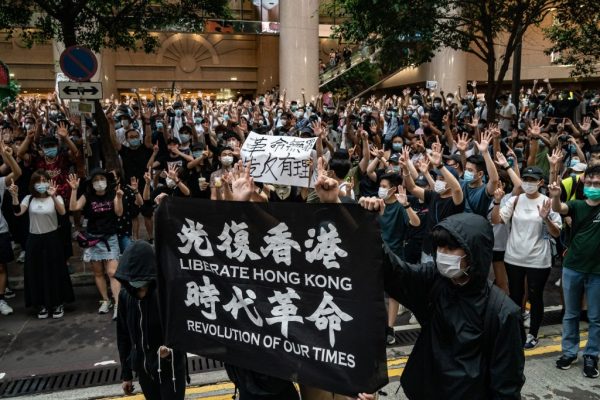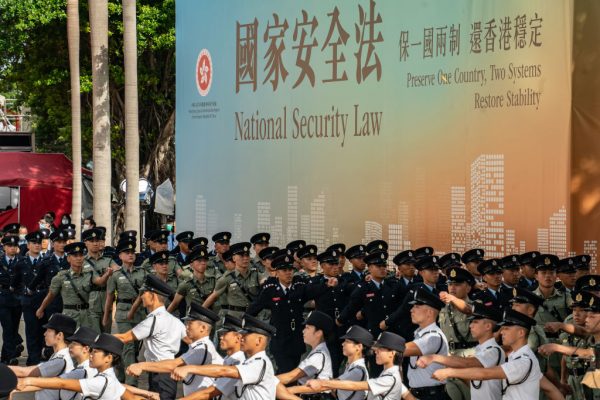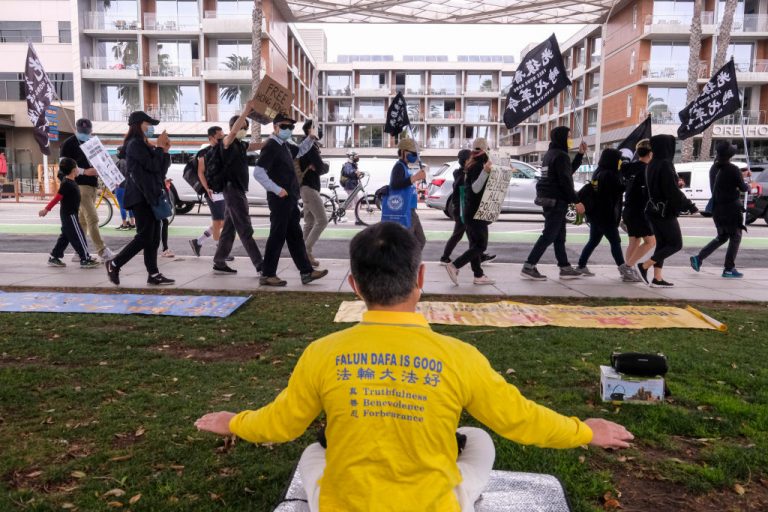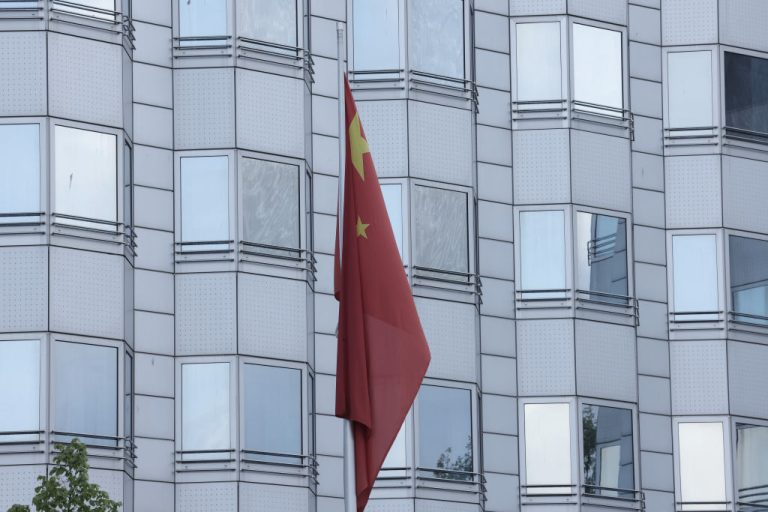News analysis
Hong Kong has long been a safe haven for practitioners of Falun Gong, the spiritual practice that has endured more than 20 years of all-out persecution by the communist regime in mainland China.
While in any ordinary part of China, performing the discipline’s five meditation exercises or reading the teachings of its founder, Li Hongzhi, can get you a grueling sentence in a labor camp or deadly abuse in a brainwashing center, Falun Gong adherents freely passing out information about the horrors visited upon their faith are a common sight on the streets of the former British colony. The Epoch Times, a newspaper founded by Falun Gong practitioners, operates in Hong Kong, running a consistent narrative of criticism against the Chinese Communist Party (CCP).
And curiously, though nearly a year has passed since the imposition of a draconian National Security Law (NSL) by the Chinese authorities that effectively banned all political dissent in Hong Kong, Falun Gong’s local presence — and its adherents’ messaging — has continued without much official action.
It’s a marked contrast to the treatment visited upon leaders of the city’s pro-democracy movement, which in 2019 saw millions of Hongkongers come out to the streets to oppose the CCP’s growing control over Hong Kong. Joshua Wong, Agnes Chow, and other icons of the struggle to preserve the city’s autonomy and freedom have been arrested and sentenced. Meanwhile, another anti-Beijing, pro-democracy outlet, Apple Daily, has had its offices raided by police and its founder, Jimmy Lai, put behind bars. On May 14, his assets were frozen.
Masked attacks
Success
You are now signed up for our newsletter
Success
Check your email to complete sign up
While not being targeted under the NSL, Falun Gong has also felt the heat. In a series of incidents over the last few months, thugs have targeted Hong Kong practitioners, The Epoch Times, and its staff. In late April, Ta Kung Pao, a local paper notorious for its pro-CCP slant, openly questioned why Falun Gong was allowed in the city, and recommended the practice be banned.

On April 12, four masked men broke into The Epoch Times’ printing press in Tsuen Wan, smashing machines and computers with sledgehammers for two minutes before fleeing the scene. Before that, Falun Gong practitioners manning information booths were harassed and had their setup vandalized; so far, Hong Kong police have apprehended eight suspects.
On May 11, Sarah Liang, a reporter for the Hong Kong edition of The Epoch Times, was attacked by a heavyset man wielding an aluminum softball bat. The assault occurred after a period of time in which Liang had noticed suspicious individuals and vehicles following her, including an incident on April 26 in which a middle-aged man stalked her before fleeing once confronted.
The U.S. State Department condemned both the assault of Liang and the break-in at the Tsuen Wan printing press.
In the red dragon’s jaws
Falun Gong is a traditional qigong practice that spread throughout China in the 1990s, with Chinese government estimates putting the number of adherents at 70 to 100 million people by 1998. The next year, Falun Gong was banned by then-CCP leader Jiang Zemin, on the grounds that its growth threatened to making a “laughingstock” of the Party and its atheist ideology,
Millions of Falun Gong practitioners have been imprisoned, with torture, slave labor, and other forms of abuse being commonplace. A large but yet impossible-to-determine number of adherents are believed to have been murdered in Chinese hospitals for their organs in a scheme devised by Jiang’s closest lieutenants.
For years, Falun Gong practitioners and The Epoch Times enjoyed relative openness because of Hong Kong’s special status under the “one country, two systems” arrangement, whereby the city retained its British-style rule of law and a wide range of political freedoms even after its return to China in 1997.
However, despite the overall worsening of freedoms in the city since the 2019 protests, incidents like those against Sarah Liang and Falun Gong practitioners in Hong Kong have been an on-and-off occurrence ever since the persecution began in mainland China.
The first major challenge surfaced in 2003, when the CCP pushed to activate Article 23 of Hong Kong’s Basic Law. The article, which would have enforced “national security” legislation similar to that of the NSL eventually passed in 2020, was seen as being directed at the Falun Gong practitioners in the city. However, Beijing gave up trying to enforce Article 23 when 500,000 citizens rallied against Article 23 in massive protests.
In 2012, shortly following the rise to power of current Chinese leader Xi Jinping, a group called the Hong Kong Youth Care Association, or HKYCA, was founded. HKYCA members harassed and intimidated Falun Gong practitioners in the city, being the prime suspect in an incident involving the beating of a Falun Gong supporter as early as 2013.
Two struggles for Hong Kong
Analysis of both recent events in Hong Kong and broader political developments in the Communist Party help explain the perplexing treatment of Falun Gong following implementation of the NSL.
Under the 1984 Sino-British Joint Declaration, Hong Kong was to retain its unique system for 50 years, until 2047. Many observers around the world and in the city assumed that by then, mainland China would have become a democracy, or sufficiently reformed so as to make deeper integration with the mainland palpable to the city’s residents.
Instead, the CCP quickly began to interfere with Hong Kong’s governance and society, quickly establishing a stranglehold on the selection of top officials, including the city’s Chief Executive.
Discontent and fear over the Party’s encroachment on their city led to a strong vein of political and social resistance to mainland China among Hongkongers, which has boiled over in various protests, notably the 2014 Umbrella Movement and the 2019 anti-extradition demonstrations. The latter turned into a full-fledged pro-democracy movement drawing millions of participants among Hong Kong’s 7 million people. It is also one of the main reasons Beijing ultimately decided to push through the NSL.

But apart from the CCP’s desire to assimilate Hong Kong to its dictatorship, fierce factional struggle in the Party’s upper ranks has also had a major role to play in the city’s fate.
Despite stepping down from his posts in the early 2000s, former Chinese leader Jiang Zemin and his allies retained dominance over the CCP regime throughout the first decade of the 21st century, largely sidestepping Jiang’s successor Hu Jintao via the system of “collective leadership.”
But in 2012, the selection of Xi Jinping as the CCP’s General Secretary presented a unique challenge to the Jiang faction. To consolidate power, Xi targeted Jiang’s network of influence, bringing down hundreds of high-ranking officials with ties to the former leader in a sweeping anti-corruption campaign that is still on the books.
However, the Jiang faction remains deeply entrenched in the regime, having developed extensive connections in the Party, state, military, and business sectors. Jiang’s right-hand man, former Chinese vice president Zeng Qinghong, retains strong influence over the CCP’s intelligence community.
According to an insider account from late 2012, the HKYCA was a Jiang faction project designed to encourage hatred of Falun Gong in the city, and was “masterminded” by Zeng. Other Jiang faction officials held or hold key posts in the CCP and Chinese government organs overseeing Hong Kong, complicating Xi’s grasp in the area.
“Zeng groomed and planted Leung Chun-ying in Hong Kong, and later used him to set up and aid the HKYCA, this inside source in Beijing said” to The Epoch Times.
Researchers at SinoInsider, a political risk consultancy specializing in Chinese regime politics, observe that Hong Kong is a key flashpoint for factional intrigue between the Xi leadership and the Jiang camp.
The persecution of Falun Gong, being the product of the Jiang Zemin era, is a political legacy that Jiang and his associates have the greatest interest in perpetuating. Meanwhile, the anti-corruption campaign and power consolidations under Xi have directly targeted the Jiang faction, with it being almost possible to predict the downfall of an official based on his or her history of persecuting Falun Gong — those who showed the most enthusiasm in the brutal campaign were more likely to rise through the ranks when Jiang was in power.
Meanwhile, the “610 Office” — jargon for an extralegal security organization specifically set up to handle the repression of Falun Gong, was technically disbanded in early 2019. By late 2020, the HKYCA, which at one point shared a headquarters with a municipal 610 Office across the border from Hong Kong, had also disbanded.
However, individuals and organizations associated with the 610 Office and HKYCA have reportedly continued to operate.
SinoInsider notes that Xi Jinping imposed the National Security Law on Hong Kong not only to crush the local democracy movement, but also to target the Jiang faction and stem its attempts to use the city as an “anti-Xi base.”
The think tank wrote in a recent newsletter that given the existence of the National Security Law, the underhanded approach to attacking Falun Gong was nonsensical, at least if one were to assume that Party Central — led by Xi — was behind the effort to extend the persecution to Hong Kong.
“The leadership could simply use the National Security Law to arrest Liang or any other Epoch Times reporter in Hong Kong, and shut down the newspaper at a moment’s notice given the media outlet’s anti-CCP stance.”
Rather, the attacks against Falun Gong and The Epoch Times appear to be carried out by underworld elements or intelligence assets linked to the Jiang faction, SinoInsider wrote. The Xi leadership, having no special interest in persecuting Falun Gong apart from the need to maintain the CCP’s ideological consistency, could even see the practice as a political “card” that might one day come into play against Jiang and his allies.







